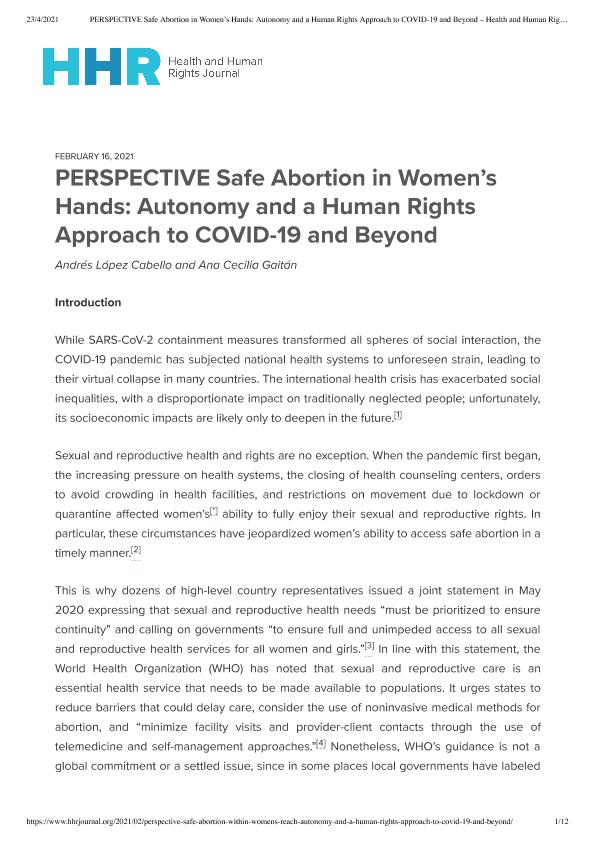Artículo
Safe Abortion in Women's Hands: Autonomy and a Human Rights Approach to COVID-19 and Beyond
Fecha de publicación:
02/2021
Editorial:
Harvard School of Public Health
Revista:
Health and Human Rights Journal
ISSN:
1079-0969
e-ISSN:
2150-4113
Idioma:
Inglés
Tipo de recurso:
Artículo publicado
Clasificación temática:
Resumen
While SARS-CoV-2 containment measures transformed all spheres of social interaction, the COVID-19 pandemic has subjected national health systems to unforeseen strain, leading to their virtual collapse in many countries. The international health crisis has exacerbated social inequalities, with a disproportionate impact on traditionally neglected people; unfortunately, its socioeconomic impacts are likely only to deepen in the future.Sexual and reproductive health and rights are no exception. When the pandemic first began, the increasing pressure on health systems, the closing of health counseling centers, orders to avoid crowding in health facilities, and restrictions on movement due to lockdown or quarantine affected women's[*] ability to fully enjoy their sexual and reproductive rights. In particular, these circumstances have jeopardized women's ability to access safe abortion in a timely manner.This is why dozens of high-level country representatives issued a joint statement in May 2020 expressing that sexual and reproductive health needs must be prioritized to ensure continuity and calling on governments ?to ensure full and unimpeded access to all sexual and reproductive health services for all women and girls. In line with this statement, the World Health Organization (WHO) has noted that sexual and reproductive care is an essential health service that needs to be made available to populations. It urges states to reduce barriers that could delay care, consider the use of noninvasive medical methods for abortion, and ?minimize facility visits and provider-client contacts through the use of telemedicine and self-management approaches. Nonetheless, WHO?s guidance is not a global commitment or a settled issue, since in some places local governments have labeled abortion a nonessential service, curtailing women's access to services that are particularly time sensitive.The issue at stake is not only that restricting abortion access fails to uphold states human rights obligations during a health crisis but also that an adequate response has the potential to empower women and avoid the over-regulation of abortion.States should seize this opportunity to deepen the trend of increased access to abortifacient drugs in pharmacies and through mail; increased self-managed medical abortions at home; and expanded use of telemedicine counseling for this purpose. This is not only consistent with scientific evidence on the safety, effectiveness, and acceptability of medical abortion but also a requirement of international human rights law, which demands that health goods and services be acceptable and, consequently, not subject to overmedicalization.Innovation and efficiency, while upholding women's rights, is the way forward during the current pandemic. This is also a chance to break taboos around medical abortion and promote greater spaces for women's bodily autonomy during the current health crisis and beyond.
Palabras clave:
Abortion
,
Autonomy
,
Human Rights
,
COVID-19
Archivos asociados
Licencia
Identificadores
Colecciones
Articulos (LICH)
Articulos de LABORATORIO DE INVESTIGACION EN CIENCIAS HUMANAS
Articulos de LABORATORIO DE INVESTIGACION EN CIENCIAS HUMANAS
Citación
Lopez Cabello, Andres; Gaitán, Ana Cecilia; Safe Abortion in Women's Hands: Autonomy and a Human Rights Approach to COVID-19 and Beyond; Harvard School of Public Health; Health and Human Rights Journal; 2-2021; 1-12
Compartir




